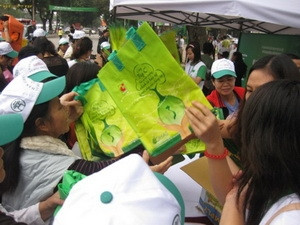Need criteria for environmentally friendly plastic bags
Nearly two months after the Law on Environmental Protection Tax came into effect, the tax on environmentally unfriendly plastic bags has been applied. However, due to the lack of clear criteria for this product, most consumers are confused in distinguishing plastic bag products. Meanwhile, production enterprises are holding back, not wanting to transfer technology.
Nearly two months after the Law on Environmental Protection Tax came into effect, the tax on environmentally unfriendly plastic bags has been applied. However, due to the lack of clear criteria for this product, most consumers are confused in distinguishing plastic bag products. Meanwhile, production enterprises are holding back, not wanting to transfer technology.
According to the explanation of Mr. Duong Hoang Tung, Deputy General Director of the General Department of Environment, plastic bags are now understood not only as thin bags that are still used in daily life, but also include packaging and plastic bags that are difficult to decompose. Environmentally friendly plastic bags must be evaluated on many criteria, not only based on whether the bag is biodegradable or non-biodegradable. If the production process of environmentally friendly plastic bags produces substances that are harmful to the environment, they must still be taxed.

Environmentally friendly plastic bags. (Source: Internet)
According to scientists, plastic bags are made from substances that are difficult to decompose. When released into the environment, it takes from decades to several centuries to completely decompose in nature. Its existence in the environment seriously affects the soil and water because plastic bags mixed into the soil will prevent oxygen from passing through the soil, causing soil erosion, making the soil unable to retain water and nutrients, thereby slowing down plant growth. More seriously, the soil and water environment polluted by plastic bags will directly and indirectly affect human health.
In fact, many types of plastic bags are made from pure petroleum, which when absorbed into water sources will enter the human body, causing dysfunction and birth defects in young children. Plastic bags clog drains, ditches, canals, and ditches, causing stagnant wastewater and flooding, leading to the production of many disease-causing bacteria.
There are currently no official statistics on the number of plastic bags used in Vietnam, but according to a survey by the environmental agency, on average, a Vietnamese person uses at least 30kg of plastic products per year. From 2005 to now, this figure is 35kg/person/year.
In 2000, Vietnam discharged an average of 800 tons of plastic waste into the environment every day. Today, that number is 2,500 tons/day and could be even higher.
Taxation on plastic bags is aimed at limiting the use of these products and avoiding their harmful effects on the environment. However, no matter how high the tax is, how clear the criteria are, if people are still not aware of using these products, the above regulations will hardly bring about the desired results./.
According to (TTXVN/Vietnam+)
